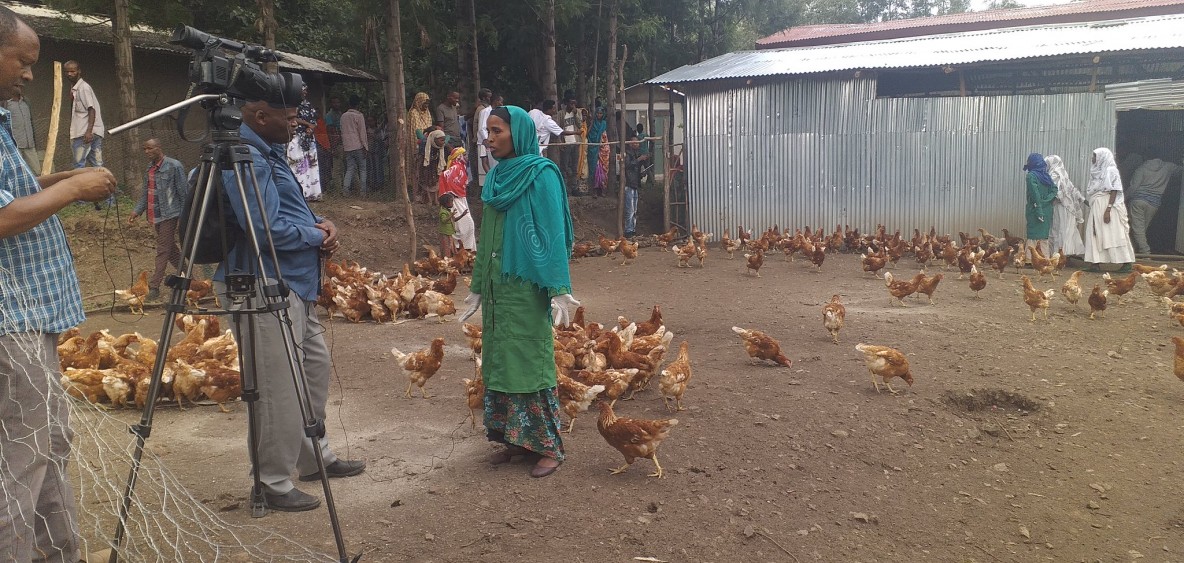 Credit: Chali Keneni, Project Coordinator for Doba District, Ethiopia
Credit: Chali Keneni, Project Coordinator for Doba District, Ethiopia The RFS Ethiopia project held an experience-sharing workshop to connect farmers with decision-makers, showcasing their successes and best practices.
The Resilient Food Systems (RFS) programme has achieved great results since its inception, both measurable and immeasurable. With all the insight gained, lessons learned and challenges faced, sharing knowledge and experiences is a key part of the RFS programme framework, fostering continuity and upscaling of results.
And who better to showcase the successes of the project uptake than the farmers themselves?
This is why, on December 23rd and 24th 2021, the Environmental Protection Authority (EPA) of Ethiopia and UNDP-led RFS Ethiopia project held an experience-sharing workshop in the Doba and Chiro districts of Oromia regional state. Attendees visited model beneficiaries’ farms where they could ask questions and see the results of their work in action.
Model beneficiaries are farmers whose exceptional motivation has led them towards harnessing the most of the support provided by their local RFS project. You might recognize some of the beneficiaries who were visited during the event, like Aliyi Mohammed or the women of the Demaksitu Cooperative. Their successes are a force of their own, necessitating their own spotlights!
But the purpose of the event was not to simply show, it was to share, and share they did with attendees who were invited from across sectors, agencies, and the region.

Attendees included 250 local farmers (45% of whom are female), 30 woreda leadership representatives, and 15 members of the national steering committees from all seven RFS Ethiopia project areas.
The successes of the RFS Ethiopia project have not gone unnoticed in recent months, garnering interest even from a local media company who produced a short documentary showcasing the positive impact of the project on local people.
To respond to the high demand for adoption and scaling out of the project best practices, Oromia regional state decision-makers were invited to participate in the visit. This open invitation attracted 42 representatives including political leaders, government officials, and monitoring and evaluation experts from other similar projects working in the region.
"The general objective of the field visit and workshop was to share the best practices of the project and develop a catalytic, upscaling and replication attitude in the minds of government officials [and] beneficiary farmers to implement [them] in Ethiopia after project closure, ensuring the sustainability of achievements and having them spread to other contexts and other areas.” - Birara Chekol, Project Leader for the RFS Ethiopia project
The visits in the experience-sharing workshop were to view innovative methods in rehabilitating degraded landscapes while generating income and improving farmers’ livelihoods.
Some examples of these included an income generation scheme that was implemented by user groups and gradually turned into a cooperative, allowing farmers to help other farmers; homestead livelihood diversification, like what we saw with Aliyi Mohammed and how he makes the most of every inch of his small farm; women’s income generation activities like the Demaksitu Cooperative’s dairy goat project; youth involvement through a model poultry farm that is being implemented by youth groups in the region; and improved seeds for fruit/fodder trees, grown in what are called multipurpose planting material multiplication centres.
One event that was notably popular among participants was the presentation of a method of irrigation. This method is technical in that it includes a solar-powered pump, but it is easy to learn and easily supported by the project. It pumps water to the surface from wells as deep as 30 metres and can be connected to household ponds (lined with a seepage controlled geo-membrane like the one Aliyi Mohammed has), and/or water collection tanks. This set-up also supports a drip-irrigation system that is useful during the dry season since it is water efficient and effective.
The other main portion of the event included an in-house workshop for woreda administrators, project coordinators, and project steering committee members. The workshop addressed project leadership, design, and implementation, sharing successes from local implementors and project facilitators.
To continue the dialogue around sustainable land management, food security, and improving farmers’ livelihoods, the RFS Ethiopia team is planning a research sharing event with their university partners (date TBD!), collecting more stories from model beneficiaries, and has even been invited to present at the World Environment Day national celebrations.
Keep an eye out for more updates from this hardworking project. They’re keen to share!
Subscribe to our monthly newsletter to receive updates on stories directly from the field across all our projects, upcoming events, new resources, and more.